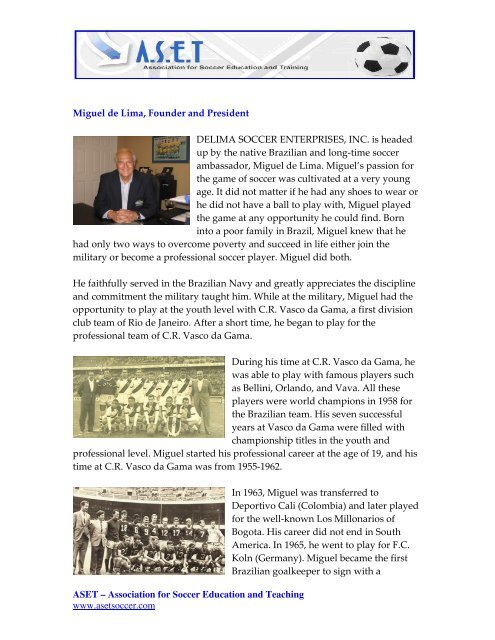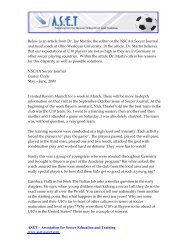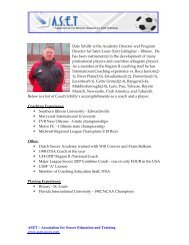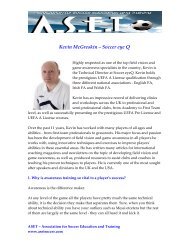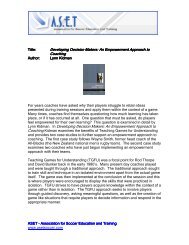Miguel de Lima, Founder and President - Association for Soccer ...
Miguel de Lima, Founder and President - Association for Soccer ...
Miguel de Lima, Founder and President - Association for Soccer ...
You also want an ePaper? Increase the reach of your titles
YUMPU automatically turns print PDFs into web optimized ePapers that Google loves.
<strong>Miguel</strong> <strong>de</strong> <strong>Lima</strong>, Foun<strong>de</strong>r <strong>and</strong> Presi<strong>de</strong>nt<br />
DELIMA SOCCER ENTERPRISES, INC. is hea<strong>de</strong>d<br />
up by the native Brazilian <strong>and</strong> long-time soccer<br />
ambassador, <strong>Miguel</strong> <strong>de</strong> <strong>Lima</strong>. <strong>Miguel</strong>’s passion <strong>for</strong><br />
the game of soccer was cultivated at a very young<br />
age. It did not matter if he had any shoes to wear or<br />
he did not have a ball to play with, <strong>Miguel</strong> played<br />
the game at any opportunity he could find. Born<br />
into a poor family in Brazil, <strong>Miguel</strong> knew that he<br />
had only two ways to overcome poverty <strong>and</strong> succeed in life either join the<br />
military or become a professional soccer player. <strong>Miguel</strong> did both.<br />
He faithfully served in the Brazilian Navy <strong>and</strong> greatly appreciates the discipline<br />
<strong>and</strong> commitment the military taught him. While at the military, <strong>Miguel</strong> had the<br />
opportunity to play at the youth level with C.R. Vasco da Gama, a first division<br />
club team of Rio <strong>de</strong> Janeiro. After a short time, he began to play <strong>for</strong> the<br />
professional team of C.R. Vasco da Gama.<br />
During his time at C.R. Vasco da Gama, he<br />
was able to play with famous players such<br />
as Bellini, Orl<strong>and</strong>o, <strong>and</strong> Vava. All these<br />
players were world champions in 1958 <strong>for</strong><br />
the Brazilian team. His seven successful<br />
years at Vasco da Gama were filled with<br />
championship titles in the youth <strong>and</strong><br />
professional level. <strong>Miguel</strong> started his professional career at the age of 19, <strong>and</strong> his<br />
time at C.R. Vasco da Gama was from 1955-1962.<br />
ASET – <strong>Association</strong> <strong>for</strong> <strong>Soccer</strong> Education <strong>and</strong> Teaching<br />
www.asetsoccer.com<br />
In 1963, <strong>Miguel</strong> was transferred to<br />
Deportivo Cali (Colombia) <strong>and</strong> later played<br />
<strong>for</strong> the well-known Los Millonarios of<br />
Bogota. His career did not end in South<br />
America. In 1965, he went to play <strong>for</strong> F.C.<br />
Koln (Germany). <strong>Miguel</strong> became the first<br />
Brazilian goalkeeper to sign with a
European team. In 1967, he went back to Brazil to play <strong>for</strong> Botafogo F.C. in Rio<br />
<strong>de</strong> Janeiro. While playing at Botafogo, <strong>Miguel</strong> played with the world’s top<br />
players at that time: Zagalo (<strong>for</strong>mer Brazilian National Team coach) Nilton<br />
Santos, Garrincha, Didi, Jairzinho, Gerson (1958 world champions.)<br />
That same year, <strong>Miguel</strong> came to the United States to play <strong>for</strong> the St. Louis Stars<br />
(North American <strong>Soccer</strong> League) based in St. Louis, Missouri. In 1968, he was<br />
transferred to the New York Generals.<br />
After a successful playing career, <strong>Miguel</strong><br />
became one of the first goalkeeper coaches<br />
ever to be hired at the college level when he<br />
joined the Saint Louis University Coaching<br />
Staff from 1972-1979. <strong>Miguel</strong>, along with<br />
Val Pelizzaro, assisted Head Coach Harry<br />
Keough. During this tenure, SLU won the<br />
1972 <strong>and</strong> 1973 NCAA National<br />
Championship <strong>and</strong> finished as the Runner-up in 1974.<br />
<strong>Miguel</strong>’s career did not stop there. He became the goalkeeper coach <strong>and</strong> head<br />
scout <strong>for</strong> the legendary New York Cosmos from 1979-1984. During his time<br />
there, the New York Cosmos won four Eastern Division Championships <strong>and</strong> two<br />
NASL National Championships.<br />
Other highlights in <strong>Miguel</strong>’s career inclu<strong>de</strong><br />
working as a member of Pele’s staff during<br />
the World Cup of 1990 in Italy, serving as<br />
the goalkeeper coach <strong>for</strong> the Brazilian<br />
Masters National Team, <strong>and</strong> being a<br />
member of the NSCAA <strong>for</strong> 25 years. Also,<br />
<strong>Miguel</strong> has been a consultant on numerous<br />
training films <strong>and</strong> books, <strong>and</strong> has directed<br />
<strong>and</strong> coached several camps <strong>and</strong> clinics around the world.<br />
For several years, <strong>Miguel</strong> has been bringing <strong>for</strong>eign teams to participate in one of<br />
the largest tournaments in the world, Dallas Cup. Brazilian teams such as Sport<br />
ASET – <strong>Association</strong> <strong>for</strong> <strong>Soccer</strong> Education <strong>and</strong> Teaching<br />
www.asetsoccer.com
Club Corinthians, Sao Paulo F.C. , Atletico Paranaense, Sport Club Vitoria,<br />
Cruzeiro, Santos F.C., <strong>and</strong> Internacional have all come through Delima <strong>Soccer</strong> to<br />
the Dallas Cup. The majority of teams that <strong>Miguel</strong> has assisted with have won<br />
the Super Group Championship titles. <strong>Miguel</strong> has also assisted with Japanense<br />
teams such as Jubilo Iwata, Consadole Sapporo, Maebashi, <strong>and</strong> Ryukei-Kashiwa.<br />
Although <strong>for</strong>merly from Brazil, <strong>Miguel</strong> has lived in the United States since 1967<br />
<strong>and</strong> is a proud United States citizen. He is the husb<strong>and</strong> of Mrs. Graca <strong>de</strong> <strong>Lima</strong>,<br />
the father of three daughters, <strong>and</strong> a proud gr<strong>and</strong>father. <strong>Miguel</strong> thanks the Lord<br />
Jesus Christ <strong>for</strong> everything He has blessed him with. He realizes that without the<br />
Lord, nothing would have been possible.<br />
Through soccer, <strong>Miguel</strong> was able to succeed<br />
in life, to travel the world, <strong>and</strong> to gain much<br />
knowledge about the game of soccer. Now,<br />
<strong>Miguel</strong> <strong>de</strong>sires <strong>for</strong> players all over the world<br />
to have an opportunity to learn all they can<br />
about soccer. Since the Pele Cup was first<br />
introduced to youth teams in 1987, <strong>Miguel</strong><br />
has been successfully conducting training<br />
camps <strong>and</strong> tours to South America, Central America, <strong>and</strong> Europe. Since that<br />
time, over 5,000 players <strong>and</strong> hundreds of parents have traveled to Brazil un<strong>de</strong>r<br />
<strong>Miguel</strong>’s direct supervision to experience a once in a lifetime opportunity<br />
<strong>Miguel</strong>’s <strong>de</strong>sire is <strong>for</strong> players to not only gain valuable soccer skills, but to<br />
experience international travel, to learn from different cultures, <strong>and</strong> to become<br />
hard-working, disciplined soccer players. <strong>Miguel</strong> values character traits such as<br />
honesty, lea<strong>de</strong>rship, <strong>and</strong> discipline just as important as soccer ability.<br />
He un<strong>de</strong>rst<strong>and</strong>s the importance of safety, supervision, clean accommodations,<br />
nutritious meals, quality soccer training, <strong>and</strong> a fun experience. In addition,<br />
<strong>Miguel</strong>’s expertise <strong>and</strong> experience have allowed him to recruit some of the best<br />
coaches in the soccer industry. <strong>Miguel</strong>’s staff of tour managers <strong>and</strong> coaches are<br />
bi-lingual, professional, <strong>and</strong> trustworthy. Players are in good h<strong>and</strong>s with the<br />
DSE staff.<br />
ASET – <strong>Association</strong> <strong>for</strong> <strong>Soccer</strong> Education <strong>and</strong> Teaching<br />
www.asetsoccer.com
1. Brazil is the most successful soccer country in the world; give your<br />
thoughts on why this is <strong>and</strong> is there anything other countries can learn<br />
from Brazil’s success?<br />
If the <strong>de</strong>finition of success is number of World Cups won, then yes, Brazil is the<br />
most successful soccer country in the world. Brazil's success starts with the<br />
country's passion <strong>for</strong> soccer. Brazilians are soccer fanatics! Brazilians spend more<br />
time playing or watching soccer than anything else. Most people know that every<br />
boy in Brazil wants to play soccer. At an early age, he starts kicking a ball<br />
whenever <strong>and</strong> where ever he can, whether that is in open lots, in the streets, or<br />
on the beach. This is how such great technical skill <strong>and</strong> com<strong>for</strong>t with the ball are<br />
<strong>de</strong>veloped <strong>and</strong> how Brazilians learn to be so creative <strong>and</strong> play with such “flair”.<br />
Why soccer you may ask? A great percentage of Brazilian players come from<br />
poorer backgrounds, where players have very limited access to practice other<br />
elite sports such as tennis, golf, <strong>and</strong> lacrosse. There<strong>for</strong>e, they turn to a sport<br />
where they only need a ball, <strong>and</strong> an open space, in other words…no expensive<br />
equipments. For thous<strong>and</strong>s of young Brazilian boys, soccer is the only means<br />
<strong>and</strong> hope they have <strong>for</strong> a better life.<br />
Through Brazilian soccer, one can easily learn to not put too much emphasis on<br />
win, win, win, but rather on loving playing game. Be passionate.<br />
What many people do not know is how sophisticated Brazilians are in all aspects<br />
of the <strong>de</strong>velopment of players <strong>and</strong> teams. For example, Brazilians have been<br />
lea<strong>de</strong>rs in the science <strong>and</strong> practice of physical <strong>de</strong>velopment of soccer. As Fabio<br />
Capello, the Italian coach of Engl<strong>and</strong>, recently remarked, “The Brazilians are not<br />
only great technical players, but their players are stronger <strong>and</strong> faster than<br />
English <strong>and</strong> European players.”<br />
2. Is there a preferred <strong>for</strong>mation that most professional teams play <strong>and</strong> if so<br />
could you provi<strong>de</strong> some insight on to why that <strong>for</strong>mation is preferred?<br />
Many people around the world associate Brazil with a traditional 4-4-2, with a<br />
flat back zonal <strong>de</strong>fense, outsi<strong>de</strong> backs that go <strong>for</strong>ward at every chance, a<br />
balanced midfield of holding, playmaking <strong>and</strong> attacking players, <strong>and</strong> two goal-<br />
ASET – <strong>Association</strong> <strong>for</strong> <strong>Soccer</strong> Education <strong>and</strong> Teaching<br />
www.asetsoccer.com
scoring strikers. Today we see many different tactical <strong>for</strong>mations used. The<br />
World Cup winning si<strong>de</strong> in 2002 played a system that reflected the <strong>de</strong>fensive<br />
philosophy of its coach, Felipe Scolari. A 3-5-2 (or 5-3-2) which uses three<br />
<strong>de</strong>fen<strong>de</strong>rs of center back quality, two wi<strong>de</strong> attacking outsi<strong>de</strong> backs/midfiel<strong>de</strong>r<br />
hybrids, two <strong>de</strong>fensive midfiel<strong>de</strong>rs, an attacking midfiel<strong>de</strong>r <strong>and</strong> two strikers.<br />
Style of play <strong>and</strong> systems vary around the country, many times based on the<br />
climate. In the hotter zones (northern Brazil) the game tends to be slower with<br />
shorter passes <strong>and</strong> more controlled possession. In the col<strong>de</strong>r zones (south of<br />
Brazil) the game is faster <strong>and</strong> more physical.<br />
3. At the youth level in Brazil when coaches are selecting players <strong>for</strong> a team;<br />
what is the first thing they look <strong>for</strong>?<br />
The saying is that we look <strong>for</strong>ward <strong>for</strong> soccer PLAYERS first (skill <strong>and</strong> technical<br />
ability) <strong>and</strong> will <strong>de</strong>velop the soccer ATHLETE later. That may be the opposite<br />
here in the US.<br />
4. What do coaches’ in Brazil feel are the most important ingredients <strong>for</strong> a<br />
successful team at both the youth <strong>and</strong> professional levels?<br />
The same ingredients anywhere really that starts with technical abilities to be<br />
able to control the ball <strong>and</strong> emphasize on finishing. I think that Brazilians train<br />
with goals <strong>and</strong> finishes more than here in the US (a lot of finishing work plus 3 v<br />
3 with goalkeepers, 5 v 5 with goalkeepers, <strong>and</strong> a great <strong>de</strong>al of time at 11 v 11 at<br />
ol<strong>de</strong>r ages). Next, as I mentioned, the physical qualities are important as<br />
Brazilians are able to <strong>de</strong>velop strong, fast <strong>and</strong> fit players.<br />
Also, not many people consi<strong>de</strong>r Brazil a country with top goalkeepers. But I<br />
believe their training methodologies <strong>for</strong> goalkeepers are as good as anywhere in<br />
the world. I believe the goalkeepers are exceptional in distributing the ball<br />
tactically. Today, we see some of the best goalkeepers from Brazil playing in<br />
Europe, mainly Italy.<br />
ASET – <strong>Association</strong> <strong>for</strong> <strong>Soccer</strong> Education <strong>and</strong> Teaching<br />
www.asetsoccer.com
5. If we place the technical <strong>and</strong> physical requirements asi<strong>de</strong> what do you feel<br />
are the most important mental requirement(s) <strong>for</strong> a player to possess if they<br />
are going to continue <strong>de</strong>veloping <strong>and</strong> improving as a player?<br />
First, the love of the game. With the love of the game a player will want to spend<br />
hours with the ball <strong>and</strong> time learning by watching games wherever he<br />
can…ol<strong>de</strong>r teams at his club, on TV etc. With a love <strong>for</strong> the game comes the<br />
motivation to improve in all aspects.<br />
Of course there are other important qualities that are interrelated with the love<br />
<strong>for</strong> the game: a player's intelligence (reading the game, managing the game),<br />
his will (<strong>de</strong>aling with challenge <strong>and</strong> adversity) his discipline on <strong>and</strong> off the field,<br />
<strong>and</strong> his lea<strong>de</strong>rship traits are also very important.<br />
6. Talk about ‘De<strong>Lima</strong> <strong>Soccer</strong>’ <strong>and</strong> the <strong>de</strong>velopment opportunities your<br />
organization can provi<strong>de</strong> <strong>for</strong> teams, individual players <strong>and</strong> coaches to<br />
travel to Brazil <strong>and</strong> train <strong>and</strong> play.<br />
Delima <strong>Soccer</strong> has been a lea<strong>de</strong>r in soccer venture to Brazil <strong>for</strong> many years.<br />
We have strong relationships with some of the top clubs in Brazil that are at the<br />
<strong>for</strong>efront of training youth <strong>and</strong> professional players: Cruzeiro Esporte Clube,<br />
Sao Paulo F.C., Atletico Paranaense, Desportivo Brasil, Oscar Inn <strong>Soccer</strong><br />
Aca<strong>de</strong>my, <strong>and</strong> ABC F.C.<br />
Since the initiation of my company, my priority has been <strong>for</strong> players <strong>and</strong> teams<br />
from around the world that travel to one of these clubs in Brazil to experience the<br />
exact training environment that the Brazilian players living at the club<br />
experience: the same coaching, the same practice drills, training si<strong>de</strong> by si<strong>de</strong><br />
with the Brazilian players, <strong>and</strong> even playing in scrimmages <strong>and</strong> friendly games.<br />
Players, teams, <strong>and</strong> coaches discover that the Brazilians players practice much<br />
har<strong>de</strong>r <strong>and</strong> more intense than most American players. A Brazilian player is<br />
typically practicing to keep his spot in the club, to advance to the next level, <strong>and</strong><br />
to ultimately make a living <strong>and</strong> to escape from a life of poverty. A Brazilian<br />
player knows that there is always a good player ready <strong>and</strong> wanting to replace<br />
him; there<strong>for</strong>e, every practice is intense because he knows that it may be his last<br />
ASET – <strong>Association</strong> <strong>for</strong> <strong>Soccer</strong> Education <strong>and</strong> Teaching<br />
www.asetsoccer.com
practice at the club. This environment makes players better; <strong>de</strong>veloping an<br />
ability to play faster, with more confi<strong>de</strong>nce, <strong>and</strong> with vision un<strong>de</strong>r high pressure<br />
conditions.<br />
DSE players are also able to watch other age groups train including the<br />
professionals. They have the unique opportunity to attend professional games<br />
<strong>and</strong> see the differences between the MLS <strong>and</strong> the European games they watch on<br />
TV <strong>and</strong> experience the Brazilian passion <strong>for</strong> soccer.<br />
DSE offers various programs <strong>for</strong> coaches <strong>and</strong> soccer players. We offer coaching<br />
courses, coaching observation trips, individual practical training, team tours, <strong>and</strong><br />
team pre-season training <strong>for</strong> clubs, high schools, colleges, <strong>and</strong> professional<br />
teams. DSE programs are available year round, with the exception of December<br />
<strong>and</strong> January.<br />
www.<strong>de</strong>limasoccer.net<br />
ASET – <strong>Association</strong> <strong>for</strong> <strong>Soccer</strong> Education <strong>and</strong> Teaching<br />
www.asetsoccer.com


